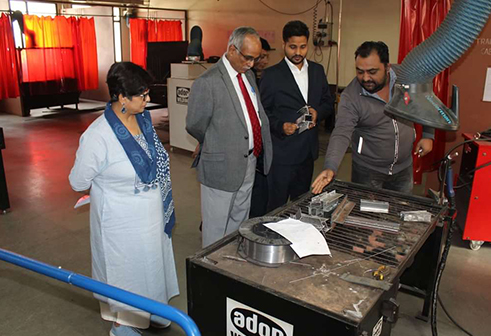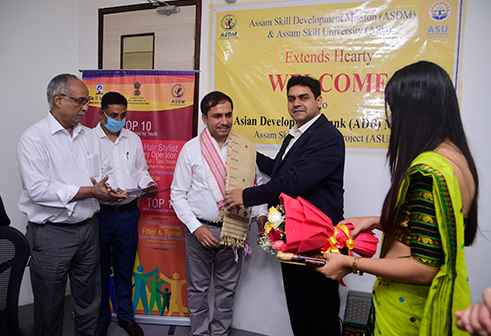

The limited supply of TVET and higher education, compounded with other issues, has constrained access to TVET and higher education in Assam. Major challenges in improving access to TVET and higher education include (i) high vacancy rates and lack of competencies among trainers and faculty members; (ii) outdated courses and programs, curricula, equipment, and facilities, which have little industry relevance; and (iii) gender stereotyping of jobs and courses, which discourages women. Moreover, lack of employability is common among graduates from ITIs and polytechnics as well as those from degree-granting engineering and academic institutions. In FY2019, the employment rate for graduates from polytechnics and engineering colleges who obtained qualifications was about
32%–34%, while that for graduates from ITIs was slightly more than 50%.11 Despite higher demands by employers for engineering, computer applications, and science degree holders, their employability remains an issue.12 The reasons are overly theory-based courses, limited industry exposure of faculty and students, and lack of career counseling for students on job search.
Although competent trainers and faculty members are crucial to ensuring the quality and relevance of TVET and higher education, adequate pre-service and in-service training systems are not in place. For instance, while the Directorate General of Training under the Ministry of Skill Development and Entrepreneurship requires all ITI trainers to obtain a National Craft Instructor Certificate at the Directorate General of Training’s national skill training institutes (NSTIs), there is no NSTI in Assam. Since ITIs are usually unwilling to send trainers to NSTIs in other states because of trainer shortages, many in-service ITI trainers in Assam do not hold a National Craft Instructor Certificate. Moreover, the capacity of NSTIs is limited. Training facilities are often outdated and disconnected from industry needs. In-service training conducted by NSTIs is not standardized in terms of its content and frequency, and the number and capability of master trainers. Courses on technical and pedagogical skills, and management and leadership skills are not always available. Training materials are poorly designed (with a focus on theory) and are not suitable for practical training or interactive learning. The use of digital technologies and industry exposure is limited.
Assam, one of the most prominent states of the North East Region commercially and being one of the most youngest workforce with 60 % population belonging to the working age group (15-59 yrs) have the opportunity to turn around the challenges and address the issues in skill development so as to meet the demand of skilled workforce in global, national and regional level.There are many public and private institutions in Assam bringing in positive outcomes in the skill development of the state by training approximately 20,000 students per year including the polytechnic institutes. However, more than 70 % of the students are left out unemployed.The combination of private and public organisations including UGC does not have a central objective and target. Due to the scattered approach, these institutions lack in accountability and proper supervision in coping with the changing demand.
There are many dedicated institutions and organisations under Skill employment and Entrepreneurship Department (SEED) to develop the skill scenario of Assam and Directorate of Technical Education responsible for a strong technical education for the upcoming talents of the region.
The Skill Employment and Entrepreneurship Department (SEED) The erstwhile labor and employment department was bifurcated on 26th September, 2016 vide Govt Notification No. AR.2/2014/42 as Skill, Employment & Entrepreneurship Department with the sub ordinate organizations as Directorate of Employment & Craftsmen Training (DE&CT) and Assam Skill Development Mission (ASDM). Skill, Employment & Entrepreneurship Department (SEED) has been established for providing good quality skill training to the youth of Assam with the mandate of implementing number of scheme as laid down by Ministry of Skill Development & Entrepreneurship (MSDE) Govt. of India and State Government. These scheme are to be accomplished on mission mode through DE&CT and ASDM. Director of Employment & Craftsmen Training (DECT) The Directorate of Employment & Craftsmen Training, Assam under the Skill Employment and Entrepreneurship Department, Govt. of Assam have three wings namely:
This Directorate is providing training avenues through 28 government Industrial Training Institutes (ITI) & 47 private ITIs of the state under Craftsman Training Scheme of Government of India, with the following objectives:
Assam Skill Development Mission is registered under Society Act in 2015 and is working under newly created Skill, Employment & Entrepreneurship Department, Govt. of Assam with the visions of capacity building of unemployed youth and to deliver quality skill training leading to meaningful employment to stimulate economy of the state. The Mission started its functioning from January, 2017 as:
There are 371 institutions/ training providers across Assam who are engaged in the Skill Development Mission with 3 ongoing schemes.
ASDM signed a MoU with ITEES, Singapore as the Global Knowledge Partner for establishing North East Skill Centre (NESC) at Guwahati. The objective of establishing a NESC is to offer high quality skills training for the masses especially the rural youth. In the first phase, NESC will provide training under the following sectors: Retail, Beauty & Wellness, Hospitality- Housekeeping and Hospitality – F&B Services.
The Assam Skill University is being setup under External Aid Project (EAP) funded Asian Development Bank. The Department of Economics Affairs, GoI has approved the financial assistance of $112 Million to ADB on 14th November 2019. The value of Project will be $140 Million (approx. Rs. 1,000 Cr) including the state share of 20%.
In September 2020, the Assam Legislative Assembly passed the Assam Skill University Act to establish Assam Skill University (ASU) in accordance with the regulations of the Government of India’s University Grants Commission. The Government of Assam envisages ASU to (i) distinguish itself as a premium institution with its campus equipped with state-of-the-art facilities and technologies; (ii) conduct skills education and training integrated with higher education, applied R&D, entrepreneurship education and support; and (iii) raise skill levels to enhance the productivity and competitiveness of industries in Assam and the North Eastern Region. The state government also expects ASU to cater for the needs of students; TVET and higher education institutions; and industries in neighboring countries, which face similar challenges in skills education and training, and with which the state has long-standing relationships. ASU will be in Mangaldoi (Darrang district), located about 74 kilometers east of Guwahati, and falling within 25 kilometers of National Highway 27 connecting Guwahati with other major cities in Assam. National Highway 27 is integrated with other modes of transport (airways, waterways, and railways) and provides important connectivity to neighboring states and countries.

Lorem ipsum dolor sit amet, consectetur adipiscing elit. Morbi a purus nisl. Duis eleifend cursus fermentum. Cras in ipsum velit.

Lorem ipsum dolor sit amet, consectetur adipiscing elit. Morbi a purus nisl. Duis eleifend cursus fermentum. Cras in ipsum velit.

Lorem ipsum dolor sit amet, consectetur adipiscing elit. Morbi a purus nisl. Duis eleifend cursus fermentum. Cras in ipsum velit.